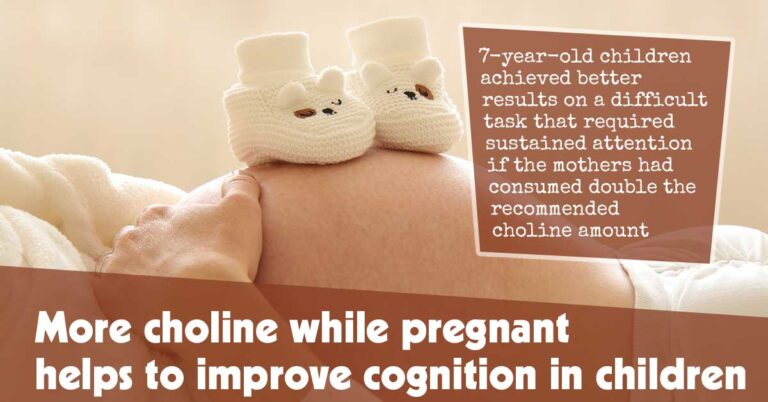Increased Choline Intake During Pregnancy Enhances Cognitive Development in Children
According to a study, 7-year old children performed better on a challenging task that required sustained concentration if their mothers consumed twice the recommended amount of choline while pregnant.
The results showed that pregnant mothers who consumed the recommended amount of choline did not meet the brain’s needs.
Most prenatal vitamins do not contain choline, which can be found in many foods, including cruciferous veggies, egg yolks and poultry, fish and lean meat. Over 90% of pregnant women don’t get the recommended daily intake.
In rodent models, years of research have shown that adding extra choline to the mother’s diet has long-term benefits for the offspring. Supplementing maternal choline to rodents can improve offspring’s memory and attention for life. It also has been shown that it is neuroprotective by reducing cognitive difficulties caused by prenatal stress and autism.
All participants consumed a diet prepared with a certain amount of choline during the third trimester. The half of the participants consumed 480 milligrams per day of choline. This is slightly more than the 450 milligrams daily recommended intake level. The other half consumed approximately 930 milligrams per day of choline.
Children of mothers in the 480 milligrams daily group showed a decrease in accuracy during a sustained-attention task at age 7, while those in the 930 milligrams daily group maintained high levels of accuracy throughout the task. These results are similar to the effects of choline supplementation and deprivation in rodents using an analogous sustained-attention task.
The results show that choline supplementation in mothers can produce similar benefits in offspring as in animals. This suggests that humans could experience the same neuroprotective and cognitive benefits that rodents have.
Researchers found in a previous study that adding maternal choline to the diet of these children improved their ability to process information during the first year of life.
These results demonstrate the importance of prenatal Choline in the cognitive development of young children by demonstrating the benefits that last well into childhood.
